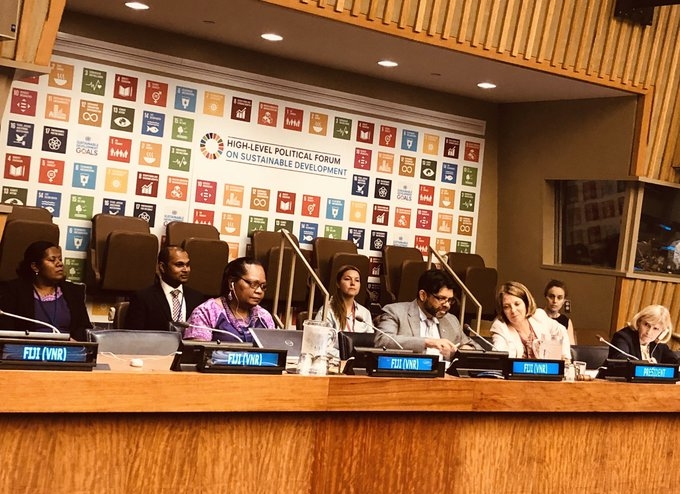By: Samisoni Pareti in New York
Fiji this week reported to the United Nations on the progress of its work in pursuing the 17 sustainable development goals (SDG) with a strong call for international donors to see climate financing as development financing.
Attorney General and Minister for Economy in the Fijian Government Aiyaz Sayed-Khaiyum told a side event held on the margins of the High Level Political Forum at the UN Headquarters in New York that the two funding streams should not be distinguished or separated.
“That’s critically important for us to understand. You cannot separate the two. You cannot have a dichotomous approach and say no this sort of funding is only for climate finance and this one is for development finance.
“They are synonymous and indeed they need to be,” Sayed-Khaiyum told a panel discussion on the Blue Pacific-Harnessing Regional Cooperation for SDG and Samoa Pathway Acceleration.
New Zealand’s former prime minister Helen Clark moderated the discussion which also featured among others, Vanuatu’s foreign minister Ralph Regenvanu. It was organised by the Pacific Islands Forum Secretariat.
Fiji’s attorney general said the adverse effects of climate change coupled with the need for UN member states to aspire to the 17 SDGs make it imperative for the two sources of financing to merge into one.
The category five cyclone that battered Fiji in 2016 and destroyed 33 per cent of the value of Fiji’s GDP in just a matter of 36 hours, together with the three storms Fiji suffered the following year, makes a strong case for the amalgamation by donors of development and climate funding.
“As a government with limited resources we can probably (offer assistance) once, you probably can do it twice, but the third or fourth time you cannot do it.
“It’s also about managing expectations. For example, if people are
homeless, and you don’t have the ability to rebuild their homes, it obviously puts a lot of socio-economic pressure not only as individuals, but as a country as a whole.”
Earlier, Sayed-Khaiyum told the UN High Level Political Forum that each and every one of the SDGs is being held hostage to the climate crisis. It makes sense therefore for the 2030 Agenda to be realised, that every decision made is climate-minded.
“In 2013, we forever enshrined these values in our constitution, shedding a long history where Fiji was mired with inequality, preferentialism and exclusion. We’ve put a special focus on bringing in those previously marginalised members of society –– particularly our women, our young people, and those living with disabilities –– ensuring that the Fijian future would be one not of oppression and missed opportunities, but one of empowerment and inclusion.
“We have achieved a near 100 per cent literacy rate, provided free primary and secondary education for the first time in Fijian history with more females in secondary schools and universities than ever before, led the world to combat climate change as COP23 president, and built an infrastructure network that has brought even Fijians living in the most rural and remote maritime regions into the fold of development.”
Fiji was one of six Pacific island members of the UN that reported to the High Level Political Forum this week. All six countries have completed their reporting by today with Nauru being the sixth island state to do so today.
Officials from the Pacific Islands Forum Secretariat that assisted the Pacific government delegations say nine Pacific island states have completed their reporting to the UN on their work on the 17 SDGs so far, with six more planning to submit their reports next year, namely Tuvalu, Federated States of Micronesia, Solomon Islands, Samoa, Kiribati and Papua New Guinea.
Each UN member states are encouraged to provide three progressive reports before 2030.
